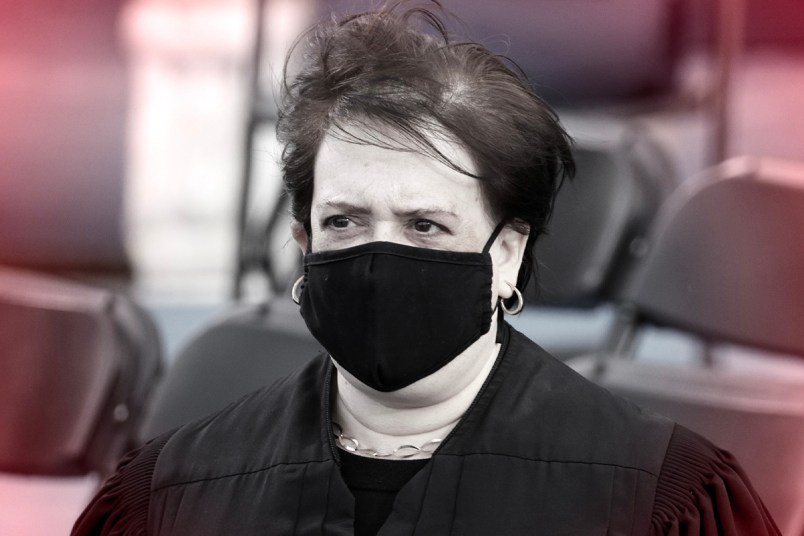As the Supreme Court confronted the independent state legislature theory on Wednesday, much of the discussion centered on parsing the Constitution, leafing through historical evidence and arguing over the meaning of old cases.
But Justice Elena Kagan paused the proceedings for a few minutes, expanding on what it would actually mean if state legislatures were allowed to become the only entities empowered to control federal elections, to the exclusion of state courts and state constitutions. It’s a role she’s been stepping into during arguments of late, taking the cases out of legal abstraction to articulate the full scope of the possible harms.
“I’d like to step back a bit and just think about consequences, because this is a theory with big consequences,” Kagan said.
She then reeled off a list: a legislature could engage in the “most extreme forms of gerrymandering” and there’d be no remedy, even if state courts found that the maps violate their constitutions; legislatures could pass endless voter restrictions without fear of a check; they could strip voter protections; they could even, she pointedly added in a seeming allusion to Donald Trump’s fake electors scheme, insert themselves into the process of certifying elections.
“You might think that it gets rid of all those checks and balances at exactly the time when they are needed most,” Kagan said. “Because legislators, we all know, have their own self interest: they want to get reelected. So there are countless times when they have incentives to suppress votes, to dilute votes, to negate votes — to prevent voters from having true access and true opportunity to engage the political process.”
Kagan highlighted a truth that has been buried in assertions by the proponents of the ISLT that the state legislatures are closer and more connected to the people than other branches, vesting them with more trustworthiness. In addition to the frequent incentives for legislators to use laws and restrictions to pick their voters rather than the other way around, many legislatures are so egregiously gerrymandered that they are, most often, far to the right of the constituents who elected them.
Justice Samuel Alito seemed to take a shot back at Kagan later in the proceedings.
“There’s been a lot of talk about the impact of this decision on democracy,” Alito said, his voice dripping with sarcasm. “Do you think it furthers democracy to transfer the political controversy about redistricting from the legislature to elected Supreme Courts where the candidates are permitted by state law to campaign on the issue of redistricting?”







The issue is checks on power.
What ISLT does is give current state legislatures unrestricted power over everything having to do with democracy which would in fact end democracy.
That is even if today a legislature would not choose to use ISLT to ignore the will of the people and pick election winners without regard to who got the most votes, tomorrow is another day.
OH, and as I am first, a picture.
I didn’t think I would be able to despise anyone as much as Mitch McConnell, but Samuel Alito is making a serious run for the money.
Republicans unbound and able to say and do what they think is a very scary proposition. The worst of them really are a nasty lot.
That this case has made it to the Supremes is Karl Rove’s dream.
We might as well give up on “These United States.”
Mitch McConnell is to a great extent responsible for the current Supreme Court and the Justice I hate most is John Roberts because he is so nakedly political.
But as to the American I hate most, currently it is Ted Cruz but only because George W Bush is not in the news.
So much mischief is available if you take certain words and phrases of the Constitution out of the entire context of the document. The result is often a Constitution that negates itself as if that were the intent when it’s really just a middle finger to the advocates of crazy positions to their political opponents.
Article 4 section 4 says that the United States GUARANTEES a republican form of government for every state. How do you square that with a theory that state legislatures are not subject to checks and balances with other parts of the government in the state or even the state constitution which establishes the legislature. Legislatures pass laws, and those laws must comply with state and federal constitutions and judicial review in every sense. So the notion that the Constitution made an exception for legislatures to do whatever they want vis-a-vis elections is ridiculous. What about if a polling place loses power on election day for 5 hours. Does the legislature have to convene and pass a law allowing that location to remain open for more time while the courts – which can act quickly – can apply reason to a particular set of facts immediately?
Based on the coverage, I don’t think the theory will outright win, but SCOTUS will allow state legislatures to challenge state court decisions in the federal courts giving them a presumption of supremacy for the election laws they pass unless the party state acting in supposed contradiction of those law can rebut that presumption. So, for example, a state court must have a good reason to, say, allow no excuse absentee voting in a pandemic despite what the legislature passed as a law, unless the state constitution expressly forbids those kinds of changes or federal protections are violated. That is, they throw them a bone and spilt the baby 80/20 in favor of state judicial review.